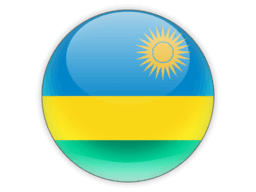
Regions of Rwanda
Explore 5 regions
Cities of Rwanda
Discover 48 cities across 5 regions
Eastern Province(9)
Kigali(2)
Northern Province(6)
Rwanda is a landlocked country located in East Africa, bordered by Uganda to the north, Tanzania to the east, Burundi to the south, and the Democratic Republic of the Congo to the west. Its capital and largest city is Kigali.
Rwanda has a population of approximately 13.6 million people, with the majority of the population being Hutu (85%) and Tutsi (14%). The official languages are Kinyarwanda, French, and English. The currency used in Rwanda is the Rwandan franc.
The country's economy is predominantly based on agriculture, with coffee and tea being major exports. In recent years, Rwanda has made efforts to diversify its economy by investing in tourism, information and communication technology, and renewable energy.
Rwanda has a complex history, with ethnic tensions between the Hutu and Tutsi peoples leading to a genocide in 1994 in which approximately 800,000 Tutsis and moderate Hutus were killed. Since then, Rwanda has made significant progress in rebuilding its society and economy. It is often cited as an example of successful post-conflict reconstruction and has achieved strong economic growth and development in recent years.
The country is also known for its beautiful natural scenery, including the Volcanoes National Park, home to the endangered mountain gorillas, and Lake Kivu, a popular destination for water sports and relaxation.
Telephone Code
250
Local Emergency Phone
Local numbers only
Vaccinations
An International Certificate of Vaccination for yellow fever is required for travelers arriving from countries with a risk of yellow fever transmission and for travelers having transited through the airport of a country with risk of yellow fever transmission. See WHO recommendations.
Climate
Temperate; two rainy seasons (February to April, November to January); mild in mountains with frost and snow possible
Currency (Code)
Rwandan francs (RWF)
Electricity/Voltage/Plug Type(s)
230 V / 50 Hz / plug types(s): C, J
Major Languages
Kinyarwanda, French, English, Swahili/Kiswahili
Major Religions
Protestant 49.5% (includes Adventist 11.8% and other Protestant 37.7%), Roman Catholic 43.7%, Muslim 2%, other 0.9% (includes Jehovah's Witness)
Potable Water
Opt for bottled water
International Driving Permit
Suggested
Road Driving Side
Right
Tourist Destinations
Kigali Genocide Memorial; Volcanoes National Park; Nyungwe Forest National Park; Ethnographic Museum; Murambi Genocide Memorial; King's Palace Museum
Major Sports
Soccer
Cultural Practices
Personal space is often much tighter in Rwanda, so do not be surprised if conversations occur at closer distances.
Tipping Guidelines
Tipping private guides $5-10 (USD) per person per day is common. Hotel and lodge staff would appreciate $5 (USD) per day.
Souvenirs
Imigongo art; tribal wall hangings, masks, weapons, and musical instruments; baskets with painted lids, embroidered cloth items
Traditional Cuisine
Brochettes — meat (typically goat, beef, chicken, or pork) or fish on a skewer, sometimes with vegetables, and roasted over hot coals; typically served with roasted potatoes, deep-fried bananas, or salad
Geography
Area
total: 26,338 sq km
land: 24,668 sq km
water: 1,670 sq km
Climate
temperate; two rainy seasons (February to April, November to January); mild in mountains with frost and snow possible
Natural resources
gold, cassiterite (tin ore), wolframite (tungsten ore), methane, hydropower, arable land
People and Society
Population
13,400,541 (2023 est.)
Ethnic groups
Hutu, Tutsi, Twa (Pygmy)
Languages
Kinyarwanda (official, universal Bantu vernacular) 93.2%, French (official) <0.1, English (official) <0.1, Swahili/Kiswahili (official, used in commercial centers) <0.1, more than one language, other 6.3%, unspecified 0.3% (2002 est.)
Religions
Protestant 57.7% (includes Adventist 12.6%), Roman Catholic 38.2%, Muslim 2.1%, other 1% (includes traditional, Jehovah's Witness), none 1.1% (2019-20 est.)
Population growth rate
1.68% (2023 est.)
Government
Government type
presidential republic
Capital
name: Kigali
Economy
Economic overview
fast-growing Sub-Saharan economy; major public investments; trade and tourism hit hard by COVID-19; increasing poverty after 2 decades of declines; Ugandan competition for regional influence; major coffee exporter; contested GDP figures
Real GDP (purchasing power parity)
$30.141 billion (2021 est.)
Real GDP per capita
$2,200 (2021 est.)
Agricultural products
bananas, sweet potatoes, cassava, potatoes, plantains, beans, maize, gourds, milk, taro
Industries
cement, agricultural products, small-scale beverages, soap, furniture, shoes, plastic goods, textiles, cigarettes
Exports
$2.11 billion (2021 est.)
Exports - partners
United Arab Emirates 35%, Democratic Republic of the Congo 28%, Uganda 5% (2019)
Exports - commodities
gold, refined petroleum, coffee, tea, tin (2019)
Imports
$3.856 billion (2021 est.)
Imports - partners
China 17%, Kenya 10%, Tanzania 9%, United Arab Emirates 9%, India 7%, Saudi Arabia 5% (2019)
Imports - commodities
refined petroleum, gold, raw sugar, packaged medicines, broadcasting equipment (2019)
International Airports in Rwanda
Discover 2 major airports serving Rwanda
Mark Rwanda as Visited
Add Rwanda to your personal travel map and track your journey around the world. Share your adventures and see your progress grow!